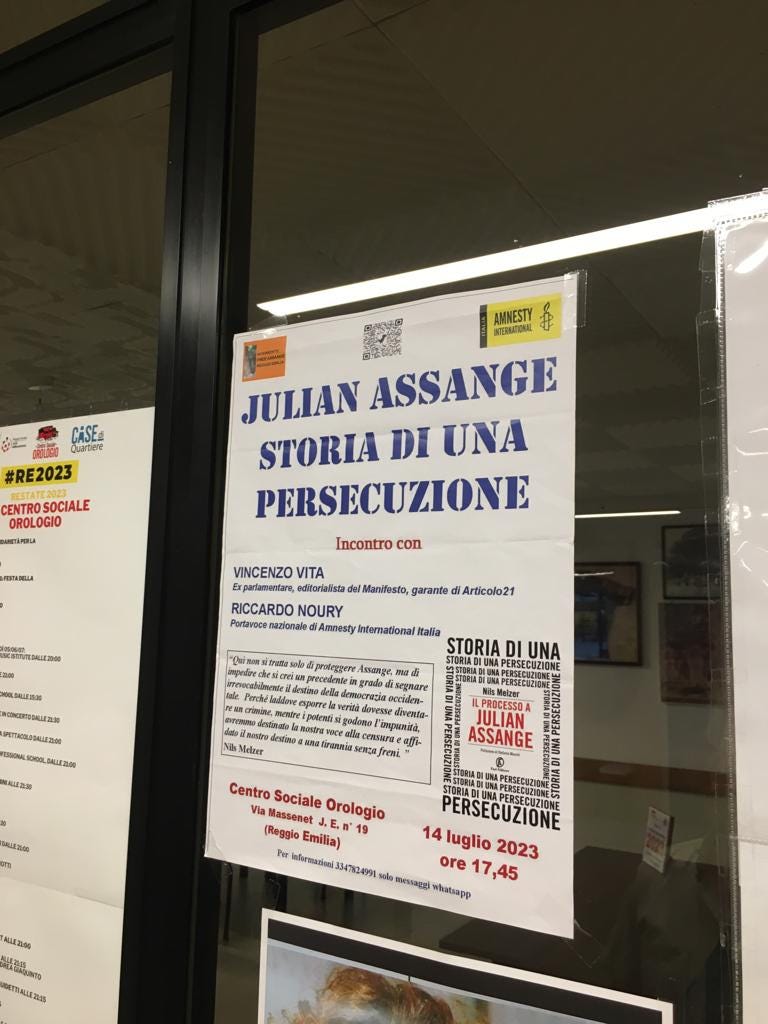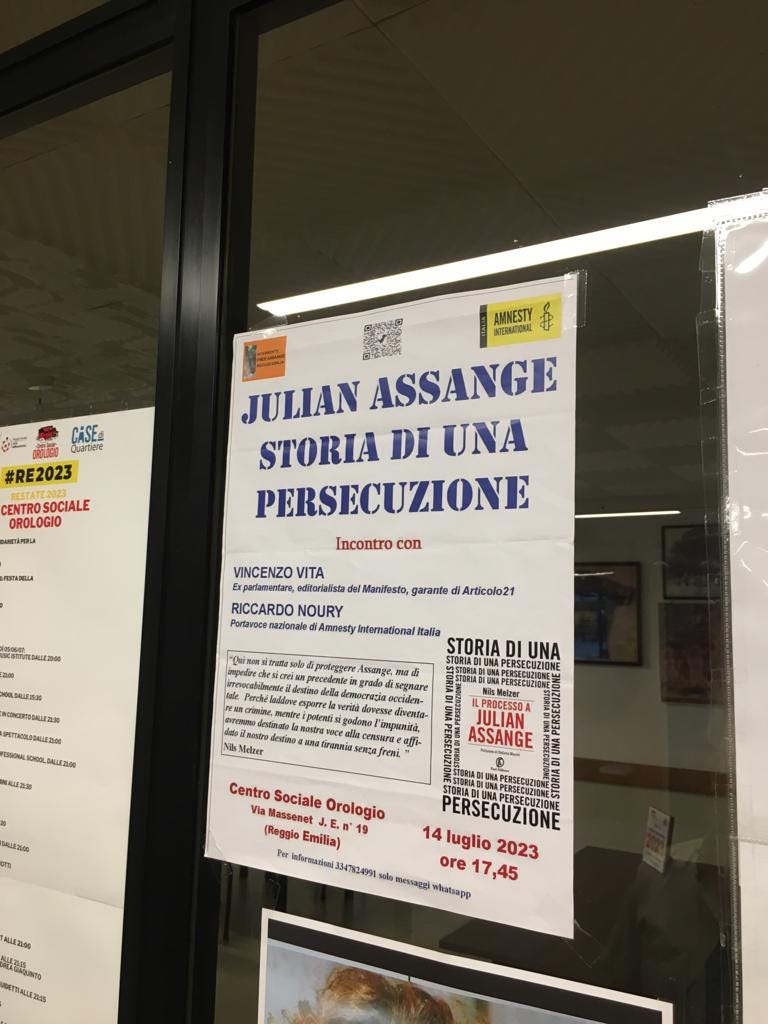👁🗨 “Ma voix pour Assange", le pays Basque & Articolo 21 continuent de défendre le droit à l'information
L'affaire Assange montre qu'aucun droit n'est acquis, et que la bataille pour une information libre est incontournable, car "la transparence est une condition indispensable à la démocratie".
👁🗨 “Ma voix pour Assange", le pays Basque & Articolo 21 continuent de défendre le droit à l'information
Par Giuliano Santelli, le 16 juillet 2023 - English version below
Après la rencontre de vendredi consacrée à la tragédie d'Ustica*, le Festival basque des droits de l'homme se poursuit avec "Ma voix pour Assange".
En collaboration avec le présidium d'Orvieto, le Festival basque des droits de l'homme, avec Vincenzo Vita, Flavia Donati et Guido Barlozzetti, a exploré le cas de Julian Assange, ouvrant un débat plus large sur le rôle de l'information.
“On ne peut qu'être solidaire d'Assange, cela semble évident mais ça ne l'est pas. L'issue de l'affaire n'est pas non plus gagnée d'avance". C'est ainsi que M. Barlozzetti a ouvert la réunion, se concentrant immédiatement sur l'importance de continuer à lancer des initiatives pour libérer M. Assange, en mobilisant l'opinion publique.
"L'affaire peut être considérée comme un symptôme qui ne concerne pas seulement Assange, mais quelque chose de plus grand, en lien avec la crise d'un modèle de démocratie, la crise de l'État de droit qui caractérise ce passage du monde".
Wikileaks est né d'un projet de lutte pour le droit à l'information, et Assange a été arrêté au Royaume-Uni en 2019 pour son travail, c'est-à-dire pour avoir rendu publiques des informations d'intérêt public. Depuis, le gouvernement américain demande son extradition pour espionnage et conspiration. Si tout cela s'est fait en toute légalité, il est juste de s'interroger sur le rôle de l'information. Et exiger la libération d'Assange, c'est se battre pour que l'information soit libre, et retrouve son rôle de garant de la démocratie. L'élément révolutionnaire de Wikileaks, expliqué par Flavia Donati, est d'être "une plateforme internationale qui reçoit des informations avérées et documentées de manière cryptée", dénonçant des comportements "non éthiques".
La plateforme a permis de publier anonymement des documents secrets de gouvernements ou d'entreprises reçus de sources contraires au politiquement admis. Ainsi, poursuit Mme Donati, Wikileaks "est né de la prise de conscience que nous, citoyens, ne savons pas ce qui se passe. La motivation n'est pas le scoop", au contraire, et ceux qui ont publié les informations ont payé de leur personne "pour pouvoir communiquer ce qui se passait". Un autre aspect mis en lumière par toute cette affaire est que "les crimes de guerre dénoncés n'ont été jugés par aucun tribunal, mais le journaliste qui les a diffusés l'a été, lui". Dans ce scénario, la priorité n'est pas la vérité, ou une prise de conscience de la réalité, mais la dissimulation, le discours autorisé, et non ce que le public doit savoir. “En confusion, on punit ceux qui se battent pour la vérité. Assange risque d'être condamné en référence à une loi de 1917, et s’il est condamné, ce ne serait pas seulement la fin d'une vie humaine, mais aussi un avertissement global : quiconque met son nez dans le pouvoir secret, et donc dans les guerres, comme celles d’Afghanistan, d’Irak [...] est affecté par le pouvoir réel", déclare Vita. "Si Assange est condamné, c’est le droit d'informer qui est condamné, et le journalisme d'investigation est perdu”.
Il doit exister ce que Vita définit comme une "contre-information" capable de "reprendre les mêmes informations que celles qui sont diffusées", construisant ainsi une alternative à partir des faits. Depuis le début, l'affaire a impliqué quatre pays : l'Angleterre, les États-Unis, l'Australie, pays d'origine d'Assange, et la Suède, où tout a commencé. C'est en effet là qu'Assange a été initialement accusé d'inconduite sexuelle, une fausse accusation d'ailleurs été abandonnée, mais qui a déclenché une machination destinée à museler l'information, et trouver en la personne d'Assange un bouc émissaire. Cependant, une lumière semble se dessiner dans cette sombre affaire : "Le groupe de défense a annoncé que si la décision d'extrader Assange était prise, il était prêt à faire appel devant la Cour européenne des droits de l'homme. Il semble que des actions soient entreprises pour faire avancer les choses, la dernière en date étant l'audience accordée à Stella Moris par le pape François”.
"Une initiative de la part du Saint-Siège est en cours, espérons-le, même si l'on n'en connaît pas les effets.” Dans toute l'Italie, les gens continuent d'appeler à la libération d'Assange, y compris par des gestes symboliques, mais concrets, stimulant la solidarité. Dès la semaine prochaine, la motion sur la citoyenneté d'Assange pourrait en effet parvenir à la salle du conseil du Campidoglio, une action également initiée par la municipalité de Baschi, comme l'a annoncé le maire Damiano Bernardini.
Ce qui s'est passé hier au Festival des droits de l'homme prouve que la mise en œuvre de telles initiatives culturelles est fondamentale, car elle permet de "briser certains tabous et de mettre le nez dans certains modèles d'information dominants". L'opinion publique compte, et continuer à la stimuler en faisant bouger les consciences permettra de faire la différence, d'agir concrètement même face à l'injustice, en sensibilisant et améliorent les communautés. L'affaire Assange montre qu'aucun droit n'est acquis, et que la bataille pour une information libre est incontournable, car "la transparence est une condition indispensable à la démocratie".
Liberté pour Julian Assange.
* Tragédie d’Ustica : Le 27 juin 1980 à 20 h 59, un Douglas DC-9-15 effectuant le vol Itavia 870 Bologne-Palerme s'abime en mer Tyrrhénienne, près de l'île d'Ustica (nord de la Sicile), probablement abattu par un missile, tuant les 81 personnes à bord.
Les causes de l'accident n'ont jamais été éclaircies. Depuis 1999, l'enquête du magistrat italien Rosario Priore s'oriente vers la thèse d'un tir de missiles d'un avion de l'OTAN, qui aurait été français ou américain : celui-ci aurait abattu par erreur le DC-9 en pourchassant un MiG-23 libyen qui se serait dissimulé derrière (technique courante pour échapper à la détection radar). Cette thèse avait déjà été évoquée par la Commissione Stragi, établie en 1988.
L'ex-président de la République Francesco Cossiga, et Rosario Priore ont évoqué une tentative d'assassinat de Kadhafi.
👁🗨 "My voice for Assange", the Pays Basque and Articolo 21 continue to defend the right to information
By Giuliano Santelli, July 16, 2023
After Friday's meeting dedicated to the Ustica tragedy*, the Basque Human Rights Festival continues with "My voice for Assange".
In collaboration with the Orvieto Presidium, the Basque Human Rights Festival, with Vincenzo Vita, Flavia Donati and Guido Barlozzetti, explored the case of Julian Assange, opening up a wider debate on the role of information.
"We can only show solidarity with Assange - it seems obvious, but it's not. The outcome of the case is not a foregone conclusion either". This was how Mr. Barlozzetti opened the meeting, immediately focusing on the importance of continuing to launch initiatives to free Mr. Assange, by mobilizing public opinion.
"The case can be seen as a symptom that concerns not just Assange, but something bigger, linked to the crisis of a model of democracy, the crisis of the rule of law that characterizes this passage of the world."
Wikileaks was born out of a project to fight for the right to information, and Assange was arrested in the UK in 2019 for his work, i.e. for making public information of public interest. Since then, the US government has requested his extradition on charges of espionage and conspiracy. If all this was done legally, it's fair to question the role of information. And to demand Assange's release is to fight for information to be free, and to regain its role as a guarantor of democracy. The revolutionary element of Wikileaks, explained Flavia Donati, is that it is "an international platform that receives proven and documented information in encrypted form", denouncing "unethical" behavior.
The platform has made it possible to anonymously publish secret government or corporate documents received from sources contrary to the politically accepted. Thus, continues Ms. Donati, Wikileaks "was born out of the realization that we citizens don't know what's going on. The motivation was not to get the scoop", on the contrary, and those who published the information paid personally "to be able to communicate what was going on". Another aspect highlighted by this whole affair is that "the war crimes denounced have not been judged by any court, but the journalist who published them has". In this scenario, the priority is not the truth, or an awareness of reality, but the cover-up, the authorized discourse, not what the public needs to know. "In confusion, we punish those who fight for the truth. Assange risks being condemned with reference to a 1917 law, and if he is condemned, it would not only be the end of a human life, but also a global warning: anyone who sticks his nose into secret power, and therefore into wars, like those in Afghanistan, Iraq [...] is affected by real power," says Vita. "If Assange is condemned, it is the right to inform that is condemned, and investigative journalism is lost".
There must be what Vita defines as a "counter-information" capable of "taking up the same information that is being disseminated", thus building an alternative from the facts. From the outset, the affair has involved four countries: England, the United States, Assange's native Australia, and Sweden, where it all began. It was here that Assange was initially accused of sexual misconduct, a false accusation which was later dropped, but which triggered a machination designed to muzzle information and find a scapegoat in Assange. However, a light seems to be emerging in this dark affair: "The defense group has announced that if the decision to extradite Assange is taken, it is ready to appeal to the European Court of Human Rights. It seems that actions are being taken to move things forward, the latest being the audience granted to Stella Moris by Pope Francis."
"An initiative on the part of the Holy See is hopefully underway, even if its effects are unknown." Across Italy, people continue to call for Assange's release, including through symbolic but concrete gestures, stimulating solidarity. As early as next week, the motion on Assange's citizenship could indeed reach the Campidoglio council chamber, an action also initiated by the municipality of Baschi, as announced by Mayor Damiano Bernardini.
What happened yesterday at the Human Rights Festival proves that the implementation of such cultural initiatives is fundamental, as it allows us to "break certain taboos and turn our noses up at certain dominant information models". Public opinion counts, and continuing to stimulate it by stirring people's consciences will make a difference, even in the face of injustice, by raising awareness and improving communities. The Assange affair shows that no right is undeniable, and that the battle for free information is inescapable, because "transparency is an indispensable condition for democracy".
Freedom for Julian Assange.
* Ustica tragedy: On June 27, 1980, at 8:59 p.m., a Douglas DC-9-15 on flight Itavia 870 from Bologna to Palermo crashed into the Tyrrhenian Sea near the island of Ustica (northern Sicily), probably shot down by a missile, killing all 81 people on board.
The causes of the accident have never been clarified. Since 1999, the investigation by Italian magistrate Rosario Priore has focused on the theory that a missile was fired by a NATO aircraft, possibly French or American, which mistakenly shot down the DC-9 while chasing a Libyan MiG-23 that was hiding behind it (a common technique for evading radar detection). This theory had already been put forward by the Stragi Commission, set up in 1988.
Former President of the Republic Francesco Cossiga and Rosario Priore have also suggested an assassination attempt on Gaddafi.





